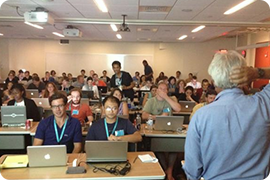
The Marine Biological Laboratory in Woods Hole. MA will be offering their “STAMPS”: (Strategies & Techniques for Analyzing Microbial Population Structures) Course this August (8/3-8/13).
Course Dates: August 3 — August 13, 2016 Deadline: April 8, 2016 | Apply here Course Website Course Schedule Directors: Mitchell L. Sogin, MBL and David B. Mark Welch, MBL Deep DNA sequencing using…
Source: Strategies and Techniques for Analyzing Microbial Population Structures (STAMPS)
Details on the course are below. To apply see this web site: here. DUE DATE IS APRIL 8.
Note – funds are available to cover the costs (tuition, room and board, but not travel) of 10 people who work on “Microbiology of the Built Environment” .
From the announcement:
Deep DNA sequencing using massively-parallel, next-generation technology has enabled nearly comprehensive environmental surveys that can describe the different kinds of microbes in a community and their relative abundance. These descriptions of richness and evenness make possible estimates of microbial diversity, but the size of the required data sets pose enormous computational challenges. The rapidly expanding flow of information from next generation DNA sequencing platforms has fueled healthy debate about best practices for data analysis while at the same time building a user demand for tools that can address important ecological questions. The STAMPS course will promote dialogue and the exchange of ideas between experts in analysis of metagenomic data and offer interdisciplinary bioinformatic and statistical training to practitioners of molecular microbial ecology and genomics.
Topics to be covered include but are not limited to acquisition and organization of next generation sequence data; principles of quality control of sequence data and data management; methods of taxonomic assignment and clustering of targeted gene data; assembly, functional classification and characterization of shotgun metagenomic data; statistical models for estimating microbial diversity; and microbial community comparison methodology and metrics. The workshop also includes an introduction to the Linux command-line and R statistical environments. The lectures will be augmented by a computer laboratory where students will have the opportunity to use state of the art facilities to test theoretical concepts described in the lectures series. Guided by authors of resources including CatchAll, LEfSe, mothur, Oligotyping, MetaPathways, MetaPhlAn, PhyloSeq, QIIME, USEARCH, Unifrac, and VAMPS, participants in the workshop will have the opportunity to compare different analysis techniques for molecular data, analyze their own data, and discuss their data and analyses with faculty.
The course is designed for established investigators, postdoctoral fellows and advanced graduate students from diverse biological fields. The Workshop Participants will also be given priority for acceptance into the MBL’s Workshop in Molecular Evolution that will meet the preceding week. This option will provide an opportunity to develop a stronger conceptual framework for understanding the basis of analytical tools in the STAMPS workshop.
Some comments from Twitter about the course: